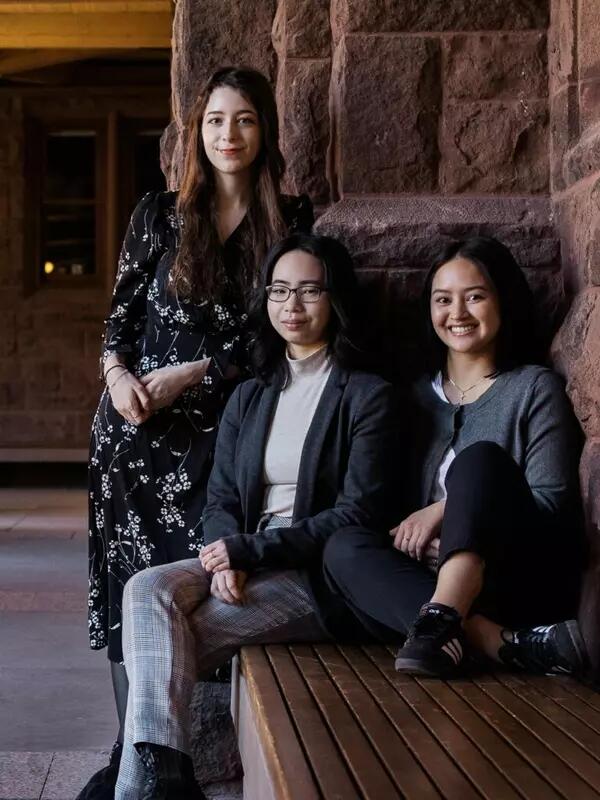
U of T Students Conduct Research in South Korea, Thanks to Insights Through Asia Challenge
Last year, Chloe Panganiban, Nadia Schwartz Rivero and Catherine Yang decided they wanted to collaborate on a big research project that could incorporate all their academic specialties – global health for Panganiban, history and psychology for Schwartz Rivero, and criminology and sociolegal studies for Yang.
The three University of Toronto undergrads just had to figure out exactly what that would be.
After several conversations and some brainstorming, they landed on the topic of medical tourism in South Korea. For more than a decade, there’s been a rapid rise in people travelling to South Korea for medical care, which can range from plastic surgery to cancer treatment.
“We were really trying to find an intersection of all our different interests and at the same time look for something where there was a research gap,” says Yang.
In-person research
Thanks to the Richard Charles Lee Insights Through Asia Challenge (ITAC), an experiential learning program at the Asian Institute in the Munk School of Global Affairs & Public Policy, the students were able to travel to Seoul for two-and-a-half weeks last summer for in-person research.
They conducted interviews with South Koreans, visited local hospitals and agencies, and toured around South Korea “to see the effects of medical tourism itself and just how the industry works with international patients and tourists,” explains Schwartz Rivero, who first met Panganiban through another ITAC research project the previous year, and has been friends with Yang since they first met in the Vic One program in their first year.
Titled “Why here and not there? An exploratory, qualitative study about medical tourism in South Korea,” the goal of their research was to better understand the country’s role in medical tourism on a global scale and why people choose South Korea and Seoul over other destinations.
Combining their different academic backgrounds made the study more insightful, says Panganiban.
Medical tourism shaped by many different fields
“Medical tourism is something that’s shaped and influenced by so many different fields. Particularly, in South Korea, it’s backed up by legislation that allows tourists to come there for medical purposes – and actually encourages that,” she explains.
The ITAC program supports original student research and research-related travel; any U of T undergraduate or graduate students can apply, with priority given to students at the Asian Institute.
“The program was instrumental in supporting our travel to Korea. I think being there in person brings about a very different opportunity when you’re interviewing people. You can develop deeper conversations, relationships and connections, which otherwise wouldn’t have been possible,” says Yang.
“Another important facet is the guidance systems made available through programs like ITAC. It’s not just monetary funding; there are also mentors and other academics you can look to for help through this program,” she adds, noting that they’re all very grateful for the guidance they received from their research supervisor on this project, Professor Rachel Silvey, who is also the Richard Charles Lee Director of the Asian Institute.
Named after prominent Hong Kong businessman and philanthropist Richard Charles Lee (who was also the father of former Canadian senator, U of T chancellor and alumna Vivienne Poy), the Richard Charles Lee Insights Through Asia Challenge was launched in 2016 and is funded by an anonymous donor.
In 2023, 10 research teams received ITAC funding. Other recipients include a team studying mental health discourses in the recruitment and training of overseas Filipina workers and a team exploring climate change and environmental degradation in a Cambodian floating village.
Invaluable opportunity
For Panganiban, Schwartz Rivero and Yang, the opportunity to lead an original research study overseas was invaluable. “Leading a research project in your undergrad is quite rare,” says Panganiban. “It was an unforgettable experience and something that was really a highlight for all of us in our undergraduate journeys.”
Yang adds that it helped her decide whether academic research was something she wanted to pursue long term. It turns out it is – after she graduates with her BA this June, she plans to apply for grad school in the future.
Panganiban, who will graduate with an Honours Bachelor of Science this June, plans to pursue a Master of Public Health in the near future. Schwartz Rivero, who graduated a year ahead of the other two, has just completed the first year of a Master of Arts degree at the Centre for European, Russian, and Eurasian Studies (CERES) at the Munk School.
Meanwhile, the trio is continuing their research on the medical tourism study by adding a systematic data analysis of their findings, says Panganiban. “We’re in the data cleaning phase right now and looking to hopefully get an academic publication out with our research and findings.”

